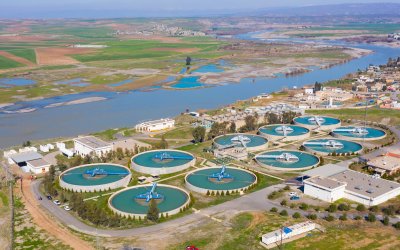On October 27, an emergency session of the United Nations General Assembly adopted a resolution calling for a durable and sustained humanitarian truce leading to a cessation of hostilities in Gaza. The result of this session contained a surprise: The Iraqi delegation had abstained during voting on the resolution. This seemed strange given the widespread empathy among Iraqis — including the dominant political factions — with the suffering of the people of Gaza caused by the collective punishment inflicted on them by the Israeli army. The ensuing public uproar forced the delegation to correct its position and vote in favor of the resolution. A statement by Iraq’s foreign ministry explained why Iraq had initially abstained: first, the resolution placed Palestinian and Israeli civilians on an equal level; second, it suggested support for a two-state solution. The ministry said “the resolution included words and phrases that contradicted [our] national legislation.”
Months prior to the outbreak of war in Gaza, the Iraqi parliament debated and eventually passed legislation that imposed either the death penalty or a life sentence on any Iraqi citizen convicted of establishing any form of relations with Israel or advocating for the normalization of such relations. Shia cleric and political leader Muqtada al-Sadr mobilized his MPs to pass this law, partly in response to insinuations from his Shia Islamist rivals that his political allies at the time — the Kurdistan Democratic Party (KDP) and Mohammed al-Halbousi’s Taqadom Party — were secretly working to normalize relations with Israel. The law passed with nearly unanimous support from legislators. One can understand the awkward position that Iraq’s UN delegation faced. While they supported a call for a ceasefire, they could not risk supporting a resolution with language that might put them at risk of violating the new anti-normalization law.
Consensus and competition
It should not come as a surprise that Iraqi factions compete to be more visibly supportive of the Palestinian people and are more hostile to Israel than their rivals. In Iraq, this is one of very few positions on which there is widespread agreement across political and ethno-sectarian lines. For example, the Dawa Party issued a statement on October 12, 2023 describing the Israeli-imposed blockade on Gaza as “barbaric” and calling on Muslims to follow “the Islamic legitimate attitude” expressed by Grand Ayatollah Ali al-Sistani. The latter had issued a statement demanding the international community stand against Israel’s “brutal occupation.” He emphasized that the conflict cannot be resolved before the Palestinians “obtain their legitimate rights and the occupation is removed from their land.” Similarly, head of the Sunni Siyyada Alliance Khamis al-Khanjar demanded “a firm position to deter the Zionist entity and its militias.” Groups that were part of the 2019 Tishreen protests showed their strong support for the Palestinian people and criticized the ruling class for not taking a tougher stance against Israel and its main backer, the US. Ironically, in the past, they had been erroneously accused by the ruling class of being part of a plot by the US — and, some would add, Israel — to damage Iraq.
This broad-based support for the Palestinian cause across the political spectrum can be traced to the period of the Iraqi monarchy between 1921 and 1958. During the reign of King Faisal II, the government of Salih Jabur was the first to demand that Arab countries use oil as a “weapon” to press western governments to change their positions regarding Palestine. Iraq often adopted unequivocal rhetoric condemning the actions of Zionist militias and objecting to the partition of Palestine. However, in a grassroots response reminiscent of their current stance, opposition and civil society groups repeatedly staged demonstrations and accused the government of not doing enough to help the Palestinian people and confront Zionism. A wave of protests in 1948 that opposed the renewal of the Iraqi-British Treaty, and resulted in the dismissal of Jabur from office, started when his government sought to end strikes organized in support of Palestine.[1]
The Iraqi army fought its only war in Palestine in 1948. It resulted in the defeat of the Arab armies, the Palestinian Nakhba, and the formation of the state of Israel. Iraq, which does not directly border the area, refused to sign a cease fire agreement and is, therefore, technically still at war with Israel. Nevertheless, the public largely directed their disappointment over the calamitous defeat towards the monarchy and the ruling elite. In this context, the increasingly politicized populace’s sympathy for Palestine blended with emerging revolutionary movements opposed to colonialism and Western-backed governments. Support for Palestine did not seem like a foreign cause, but an integral part of an ideological mix of anti-colonialism that was present in main populist currents of the time: Arab nationalism, Islamism, and Communism. In sum, the period of the monarchy was the beginning of what would become a recurrent tension between the formal pro-Palestine positions of the Iraqi state and a public that viewed solidarity with Palestine as part of a larger struggle against corrupt and repressive governments.
Under Ba’athist rule starting in the 1960s, Palestine became an even more dominant theme in public discourse. During the 1970s, the Ba’athist government led the Arab rejectionist front in opposing normalization with Israel, directing its support to the most radical Palestinian groups like the Abu Nidhal Organization. It engaged in competition for leadership of the pro-Palestine cause with the other branch of the Ba’ath Party that ruled Syria and later with the revolutionary Islamic Republic of Iran. While both Iraq and Iran voiced powerful anti-Zionist rhetoric and often threatened military action, ironically the only actual war that the two countries fought during this period was against each other.
In 1991, Saddam Hussein fired 39 Scud missiles at Israel during the Gulf War. He thought that this could be his last tool to raise the cost of war for the US, embarrass his Arab opponents, and win over the Arab public. His calculations proved to be misplaced, however: A peace process between the Israelis and Palestinians began shortly after the defeat of the Iraqi army in Kuwait.
Confrontational stance, weak impact
In general, successive Iraqi governments — despite their significant ideological diversity — have vigorously opposed any steps towards normalization with Israel. This has to do with three factors. First, the ruling elite has consistently adopted anti-colonial or anti-Western political rhetoric, especially during the Republican era, which began in 1958, and the post-2003 period dominated by the Shia factions. The Ba’athist regime and today’s leaders use similar slogans regarding Palestine. In their discourses, Palestine is part of a collective “we,” defined either in Arab nationalist or Islamist terminology, versus the colonial “other,” embodied by Israel. The Kurdish political elite may be an exception here, a factor that can be explained by the Kurdish nationalist struggle against the government in Baghdad over the past century.
Second, the fact that Iraq does not border Israel and is economically independent due to its oil wealth means that it is less susceptible to Western pressure when it comes to making peace deals with Israel. Compare this to Egypt and Jordan, both of which border Israel and are in need of international financial support.
Third, the Oslo peace process was launched after Iraq’s defeat in the Gulf War. At the time, Iraq was internationally isolated and was not offered a role in this process. Therefore, Baghdad felt no need, even after 2003, to reconsider its official stance, especially since the process had stalled by then. Even when the Ba’athist regime voted in favor of the Arab Peace Initiative at the 2002 Beirut summit, its motive was to regain Arab — particularly Saudi — trust on the eve of the US invasion that would come the following year.
Post-2003 Iraq: The Silence
Another point to make here relates to the post-2003 period. Since the fall of the Ba’athist regime, Iraq has not engaged in a serious and honest conversation about Palestine. Iraqis were pre-occupied with their internal conflicts in a context of ferocious violence and disorder. Palestinians living in Iraq were not spared in the violence that followed the disastrous US-led invasion. Thousands of them were killed, displaced, or forced to flee the country during the sectarian fighting. Attacks on the community were often perpetrated by death squads linked with groups that today espouse hardline support for Palestine. At the time, the Shia-Sunni sectarian divide became such a critical feature of political mobilization that it redefined the position of many communities in a binary way: Palestinians were reduced to being “Sunni Arabs” and sympathizers of the former regime. Many Palestinians in Iraq were targeted on this basis and perished as a result. The same fate befell many Palestinians in Syria after the 2011 uprising.
These contradictory behaviors show that opposing Israeli occupation and expressing sympathy with Palestinians is rhetorically easy, but difficult to put into action. Instead, what ultimately matters is the internal struggle for power in Iraq and asserting supremacy over rivals. This says something about the ideology of the Iraqi armed factions, which today profess support for Hamas and conduct military operations ostensibly as a way to support Gaza. Their bold rhetoric is designed to reflect the public’s genuine support for Palestine, but in practice this stance largely serves the strategic goal of consolidating support among domestic loyalists and strengthening transnational circuits of military power linking Iraq and Iran. Devotion to Palestinian self-determination and broader questions of human rights are of little if any concern to these groups, as was made very clear in their systematic and violent crackdown against the Iraqi Tishreen protest movement in 2019 and their alleged involvement in sectarian killing and forced displacement during the war against the Islamic State (ISIS).
Iraqi armed groups and affiliated political parties are hardly the exception in having mixed and indefensible motives during the current crisis. The Gaza conflict also shows the role of longstanding racist ideological inclinations in blinding many Western political and intellectual elites to the injustice of Palestinian suffering and dispossession. Understandably, Western apathy towards the plight of the Palestinians and repeated unwillingness to demand a ceasefire have horrified the Iraqi public above and beyond the cynical and opportunistic sloganeering of their own elites.
Instrumentalization of the Palestinian Cause
Successive Iraqi governments and dominant political factions have tried to fashion the salience of the Palestinian cause in the public sphere in a way that embody their ideological and symbolic references. Not only has this served to punish and marginalize dissent, but it also helped the ruling elite across different periods to dictate the kinds of solidarity with Palestinians that were allowed in the public space. This was clearly the case under the Ba’athist government, which monopolized the management of public mobilization and molded any type of solidarity with Palestine to its worldview and political and security priorities.
Today, no single faction or ideology fully dominates the public sphere, due to the compartmentalization of authority along regional, ethno-sectarian, and ideological lines. The public sphere in the Kurdistan Region is obviously different from that in Baghdad, Anbar, or Basra, although there are similarities in terms of the authoritarian tendencies of the ruling parties. In the center and south, public and virtual spaces remain fragmented. However, as Shia Islamist political parties consolidate power, there are aggressive attempts to re-demarcate the boundaries between legitimate and illegitimate discourses, including on the question of Palestine.
This had an impact on the nature and language of publicly permitted solidarity with Palestine. When Sadr ordered his followers to demonstrate against Israeli war crimes and then called them to move the protests to the borders, only to retract this call later, he was seeking to control the form and scope of expressed empathy and link it with his political calculations. Similarly, Iran-allied armed groups conflate their own regional military alignments with support for the Palestinian cause when they launch military attacks on US troops, renew their calls for the end of the US military presence in Iraq, and voice support for Hamas. In these two cases, solidarity with Palestine was overshadowed by competition between different Shia Islamist political groups, with some (including Kata’ib Hezbollah and al-Nujaba) emphasizing the importance of military actions and others seeking diplomatic means.
A Final Word
The instrumentalization of the Palestinian cause by armed groups and Iraq’s elite to serve strategic goals distorts public sympathy and diminishes public expressions of solidarity. The majority of Iraqis vehemently support the Palestinian cause, reject Israel’s brutal war, and view official Western positions as hypocritical. Yet, most Iraqis do not seem to be tempted by the actions of the armed factions or their attempts to shape and control the collective response. If Iraqi activists and scholars start building a pro-Palestinian movement on their own terms, and not on the terms of the political and military elite, this could convey public solidarity in a more constructive way. It would deprive the ruling factions of an undeserved claim to morality. It could be the beginning of a more genuine debate and part of a learning process that better shapes solidarity with Palestine and the means of expressing it.
Disclaimer: The views expressed in this article are those of the author alone. They do not purport to reflect the opinions or views of the Institute of Regional and International Studies (IRIS).







